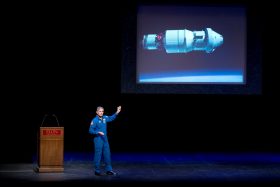Retired U.S. Air Force Col. Paul Lockhart, who piloted the space shuttle on two missions to the International Space Station, challenged students to be the next generation of explorers who will take the U.S. space program back to the moon and beyond.
 For the past 40 years, NASA has been flying shuttle missions and conducting scientific experiments at the International Space Station. But in that time, astronauts have not gone beyond the confines of earth’s gravity.
For the past 40 years, NASA has been flying shuttle missions and conducting scientific experiments at the International Space Station. But in that time, astronauts have not gone beyond the confines of earth’s gravity.
And while unmanned space missions have opened up the heavens to scientists in unimaginable ways, it’s now time for humans to go deeper into space. That’s the message astronaut Paul Lockhart, a retired U.S. Air Force Coronel and Elon parent, shared with a packed audience who came to hear him speak Sept. 19 at McCrary Theatre.
Just as Lewis and Clark took off from St. Louis 200 years ago to explore the western part of the continent, “we, too, are ready to explore,” Lockhart said. “It’s time to move out and start our next exploration series as we go further back hopedully to the moon and Mars in the next decade.”
Drawing from his experiences on two missions to the International Space Station as pilot of the space shuttle Endeavour and using images and videos projected on a large screen, Lockhart talked about the importance of the work being conducted at the station, which he described as the perfect laboratory for scientific research that deepens our understanding of the natural world and the study of short- and long-term effects being in orbit can have on the human body, including sleep deprivation, bone density, vision impairment and sensorimotor functions.
More importantly, he said, much of the space technology being developed for space exploration has a direct impact on life on earth and on every student in the audience, regardless of what field of study they choose. Just as cell phones, electric cards, wind turbines and aluminum foil can trace their origins to space technology, Lockhart said bio-robotics applications being developed for space will find their way into the medical field and other disciplines in the near future.
Lockhart also talked about the Endeavour, which following the Challenger disaster in 1986 became the fifth and last of the U.S. reusable spacecrafts. He said the shuttle was a great testament to the engineering and scientific accomplishments by NASA in the 1970s.
“It’s not just a space shuttle. It’s my space shuttle,” he said with a smile. “My job, when I leave here, is to have you excited about our nation’s space program and want to be part of it one way or another … or just to be aware so you understand what it has taken for us to put humans in space.”
As part of his talk, Lockhart took questions from students, including one about reproduction in space that brought laughs from the audience. “We don’t think about that right now,” Lockhart said, adding there is typically seven people crammed in a small space at the space station, which is really not conducive for such activities.
On a more serious note, Lockhart challenged students to support the space program moving forward.
“The nations that choose to invest in space are the nations that will continue to thrive” in the future, he said. “… I see you as the next generation of explorers that will take us back to the moon and Mars.”

During his visit to campus, Lockhart visited physics and engineering classes and held informal discussions with faculty and students. His talk Thursday night was part of the Voices of Discovery speaker series, sponsored by Elon College, the College of Arts and Sciences. The series invites noted scholars in science and mathematics to Elon to share their knowledge and experience with students.
Lockhart, whose daughter Jenna is a junior at Elon, praised Elon for its efforts to promote scientific discovery.
“From the first moment I came in contact with Elon four years ago, I’ve been overwhelmed with what I sense is excellence for all that you do,” he said.


